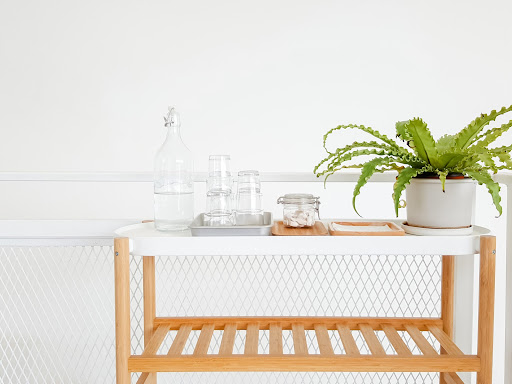
This Is How You Keep Your Home Clean The Eco-Friendly Way
If you have yet to jump on the chemical-free cleaning bandwagon, you should — here’s why. Many cleaning products release dangerous volatile organic compounds (VOCs) that can irritate eyes, ears, and throat immediately upon contact. On top of that, environmental experts say that the average home has 62 toxic chemicals lurking inside and out, many of which have been linked to hormone disruption, reproductive disorders, asthma, and neurotoxicity.
There isn’t a lot of transparency with chemical cleansers because the EPA doesn’t require companies to list ingredients. It’s not certain when — or if — legislatures across the country and federal laws will change the current state of affairs, but until then, you can’t go wrong with going green.
Indoors
- Stay Fresh And Safe: Ditch plug-ins for fragrance-free products, go for essential oils or good old-fashioned outdoor air instead. Air fresheners — along with dish soap and even toilet paper — contain phthalates, which is linked to causing lower sperm count in men via inhalation and skin contact.
- Try Wet Cleaning: Do you regularly take your drapes and upholstery to the dry cleaner? The dry-cleaning process involves perchloroethylene (PERC), which has been linked to dizziness and loss of coordination. PERC is also present in spot and carpet cleaners. Wet cleaners rely on water-based technology in lieu of chemical solvents to refresh materials — even clothing. Opt for non-toxic stain removers or castile soap before washing, should there be stubborn spots on the surface.
- Declutter: If your home is full of clutter, that can trap dust and reduce air quality. Go room by room and toss out, give away, or sell anything you no longer need. Be sure to go through all your old paperwork as well. Throw away what you no longer need, and digitize any important documents.
- Clean Up Your Multipurpose Act: Kitchen, bathroom, and multipurpose cleaners contain 2-butoxyethanol. It’s also in glass cleaner — it’s what gives it that well-known smell. According to the EPA, along with getting a sore throat when inhaled, this chemical can contribute to pulmonary edema, severe liver and kidney damage, and narcosis. Instead, clean mirrors and windows with newspaper and diluted vinegar. Mix baking soda and a couple of drops of essential oils and vinegar to make a safe all-purpose cleaner. In fact, for every chemical cleaner, there’s a DIY solution that will benefit your health, as well as your wallet.
- Filter Airborne Pollutants: Don’t forget to address the air you breathe in your home. Improving indoor air quality requires an air filter. The right one targets allergens and pollutants including dust, smoke, pollen, dander, and mold. Make sure you change your filter regularly to keep energy consumption down while keeping the pollutants out.
- Clean Furniture: This is a job that typically requires a professional, especially if you have an irremovable stain. Before hiring, check your warranties to see if cleaning is covered for any of your furniture.
Outdoors
Safety doesn’t stop indoors. Outdoor cleaning is pertinent to those around you, animals (domestic and non), and your kids and family when spending time on the patio or in the yard.
- Exterior: It doesn’t get safer than this: just use a pressure washer or hose, bucket, and mild soap. The cleaning method depends on the material of your exterior, so you may want to consult a professional if you’re not sure.The same method can be used to clean your deck or patio.
- Patio Furniture: Clean metal lawn chairs with a mixture made with a gallon of water and ¼ cup hydrogen peroxide, a squirt of all-natural dish soap, and one scoop of borax. Spray on chairs and let set for 10-15 minutes. Scrub with a soft brush and rinse with a hose. For cushions, mix tea tree oil and water (one teaspoon for every cup). Spray and leave — this will kill mold and eliminate musty odors.
- Windows: Add a few drops of baby shampoo to the indoor, diluted vinegar mixture as it will help break up grease and dirt. Use a lint-free sponge in lieu of paper towels. Remove screens and place in a tub or shower where you can easily clean with a mild soap and water solution. Rinse and dry before replacing.
Plants Are More Than Just A Pretty Decoration
If you want the cleaning process to continue when you’re off-duty, keep a few plants scattered throughout the house. Greenery can clean the air by absorbing some particulates while taking in carbon dioxide — which, in turn, is processed into oxygen. Some of the most productive plants include: spider plant, ficus, dracaena, peace lily, aloe vera, snake plant, and bamboo palm.
While you can’t change the environment as a whole, you can improve your personal surroundings. No matter what type of cleaning products you choose, make sure you keep them stored in a safe place free from children, pets, and anyone suffering from a mental illness such as dementia. Unless it’s 100 percent water, many substances are apt to propose a risk.
Photo Credit:Pexels
